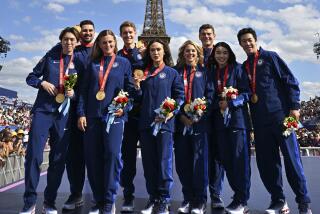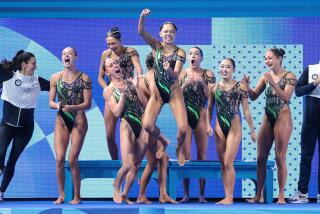Plans for Naught for U.S. Women
- Share via
Longterm strategy by the U.S. women’s eights failed miserably on the final day of competition, but that of the Netherlands’ men’s eight came up golden.
The U.S. women had trained together six hours a day, sometimes six days a week for 3 1/2 years, but on Sunday they faded to fourth, behind Romania--which finished behind the United States at last year’s world championships--Canada (silver) and Belarus (bronze).
A gold medal would have been the first for the U.S. team in a boycott-free Games.
U.S. crew members were silent as they headed back to the dock, and Catriona Fallon of Burlingame, Calif., said they didn’t know what to say to each other:
“I’m sorry we couldn’t pull it all together because I think these girls deserved to win a gold medal. I’m sure we’ll be feeling a sense of loss the next few months.”
Romania’s victory was a comfortable one for an eight that included 1992 Olympic sculls champion Elisabeta Lipa and which set a world record in June.
The Dutch men, who have found most of their success in lesser-manned boats, got a push from oarsman Nico Rienks--an Olympic champion in the double sculls in 1988--five years ago, when he wanted to put his country’s finest rowers in the same boat.
Rienks formed the eight with two of his sculling partners, Ronald Florijn and Henk Jan Zwolle.
His national rowing federation disagreed with the idea of putting all of its top oarsmen in the same boat, and it was left for Rienks to find money through a sponsor to buy a shell.
On Sunday, it all paid off when the Dutch eight took control of the race at 1,000 meters and stayed in front, finishing a third of a length ahead of their arch-rivals and world champion Germany.
It was the first medal for a Netherlands eight since it won the bronze in 1900.
As members of the crew stood in the boat, their arms raised in triumph, a dozen Dutch fans jumped into Lake Lanier to swim out to their heroes.
Australia wrapped up the eight-day Olympic regatta with six medals, including two gold, after landing 10 boats in the various finals. Canada also finished with six medals, and the United States finished with three silver and a bronze.
Teresa Z. Bell of Washington Crossing, N.J., and Lindsay Burns of Big Timber, Mont., were silver medalists in the women’s lightweight pairs, and the American men’s quadruple sculls provided two of the U.S. team’s silver medals Sunday. The U.S. men’s lightweight coxless four picked up a bronze.
Germany picked up two golds with its men’s and women’s quadruple sculls crews. Switzerland finished with two gold medals.
One was provided by brothers Michael and Markus Gier, who share an apartment in Rorschach, Switzerland, and say they are tired of the sight of each other.
They almost split up before the Atlanta Games, but agreed to stay together long enough to win the Olympic gold in the lightweight double sculls and finish an eight-year partnership on an up note.
In the women’s double sculls Canadians Marnie McBean and Kathleen Heddle failed to repeat their 1992 double gold performance, finishing third just inches behind the Ukraine. They had won in Barcelona in both coxless pairs and eights, and they won the double sculls title on Saturday.
(BEGIN TEXT OF INFOBOX / INFOGRAPHIC)
MEDALISTS / Rowing
MEN’S DOUBLE SCULLS
Gold: Glier-Glier, Switzerland
Silver: van der Linden-Aardewijn, Netherlands
Bronze: Edwards-Hicks, Austrialia
*
MEN’S QUAD SCULLS
Gold: Germany
Silver: Unites States
Bronze: Australia
*
MEN’S EIGHTS
Gold: Netherlands
Silver: Germany
Bronze: Russia
*
MEN’S COXLESS FOURS
Gold: Denmark
Silver: Canada
Bronze: United States
*
WOMEN’S DOUBLE SCULLS
Gold: Burcica-Macoviciuc, Romania
Silver: Bell-Burns, United States
Bronze: Joyce-Lee, Australia
*
WOMEN’S QUAD SCULLS
Gold: Germany
Silver: Ukraine
Bronze: Canada
*
WOMEN’S EIGHTS
Gold: Romania
Silver: Canada
Bronze: Belarus
More to Read
Go beyond the scoreboard
Get the latest on L.A.'s teams in the daily Sports Report newsletter.
You may occasionally receive promotional content from the Los Angeles Times.






